(完整版)初中英语祈使句讲解及练习
- 格式:doc
- 大小:36.05 KB
- 文档页数:5
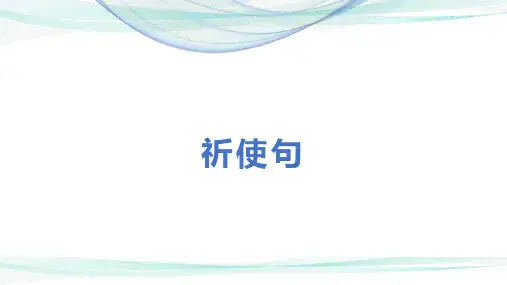
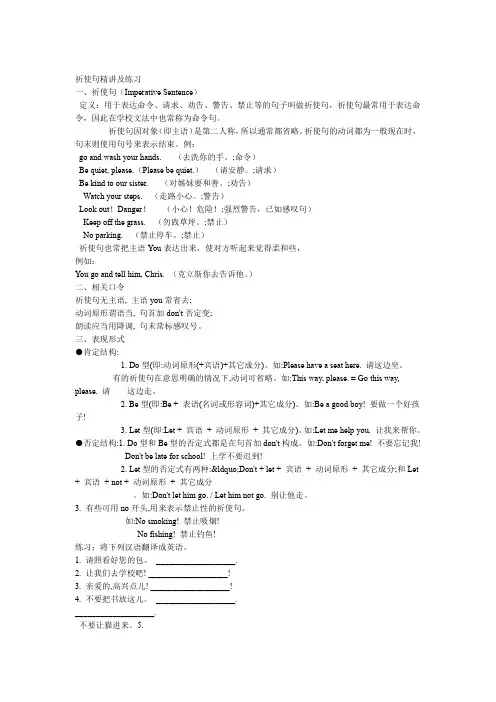
祈使句精讲及练习一、祈使句(Imperative Sentence)定义:用于表达命令、请求、劝告、警告、禁止等的句子叫做祈使句,祈使句最常用于表达命令,因此在学校文法中也常称为命令句。
祈使句因对象(即主语)是第二人称,所以通常都省略。
祈使句的动词都为一般现在时,句末则使用句号来表示结束。
例:go and wash your hands. (去洗你的手。
;命令)Be quiet, please.(Please be quiet.)(请安静。
;请求)Be kind to our sister. (对姊妹要和善。
;劝告)Watch your steps. (走路小心。
;警告)Look out!Danger!(小心!危险!;强烈警告,已如感叹句)Keep off the grass. (勿践草坪。
;禁止)No parking. (禁止停车。
;禁止)祈使句也常把主语You表达出来,使对方听起来觉得柔和些,例如:You go and tell him, Chris. (克立斯你去告诉他。
)二、相关口令祈使句无主语,主语you常省去;动词原形谓语当,句首加don't否定变;朗读应当用降调,句末常标感叹号。
三、表现形式●肯定结构:1. Do型(即:动词原形(+宾语)+其它成分)。
如:Please have a seat here. 请这边坐。
有的祈使句在意思明确的情况下,动词可省略。
如:This way, please. = Go this way, please. 请这边走。
2. Be型(即:Be + 表语(名词或形容词)+其它成分)。
如:Be a good boy! 要做一个好孩子!3. Let型(即:Let + 宾语+ 动词原形+ 其它成分)。
如:Let me help you. 让我来帮你。
●否定结构:1. Do型和Be型的否定式都是在句首加don't构成。
如:Don't forget me! 不要忘记我!Don't be late for school! 上学不要迟到!2. Let型的否定式有两种:“Don't + let + 宾语+ 动词原形+ 其它成分;和Let + 宾语+ not + 动词原形+ 其它成分。
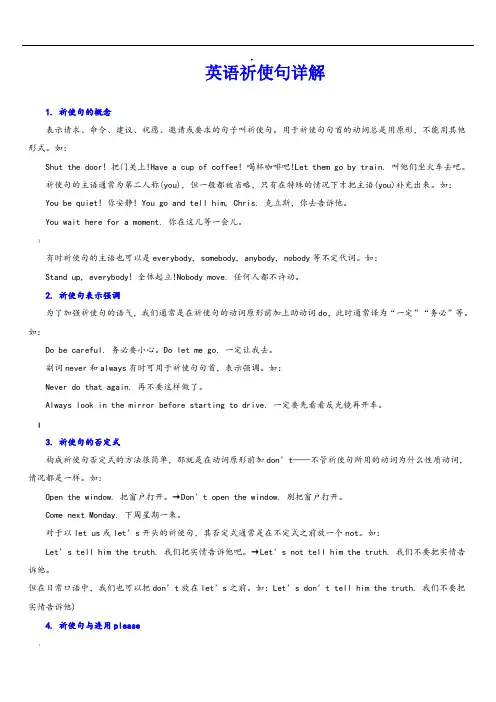
英语祈使句详解1. 祈使句的概念表示请求、命令、建议、祝愿、邀请或要求的句子叫祈使句。
用于祈使句句首的动词总是用原形,不能用其他形式。
如:Shut the door! 把门关上!Have a cup of coffee! 喝杯咖啡吧!Let them go by train. 叫他们坐火车去吧。
祈使句的主语通常为第二人称(you),但一般都被省略,只有在特殊的情况下才把主语(you)补充出来。
如:You be quiet! 你安静! You go and tell him, Chris. 克立斯,你去告诉他。
You wait here for a moment. 你在这儿等一会儿。
)有时祈使句的主语也可以是everybody, somebody, anybody, nobody等不定代词。
如:Stand up, everybody! 全体起立!Nobody move. 任何人都不许动。
2. 祈使句表示强调为了加强祈使句的语气,我们通常是在祈使句的动词原形前加上助动词do,此时通常译为“一定”“务必”等。
如:Do be careful. 务必要小心。
Do let me go. 一定让我去。
副词never和always有时可用于祈使句句首,表示强调。
如:Never do that again. 再不要这样做了。
Always look in the mirror before starting to drive. 一定要先看看反光镜再开车。
|3. 祈使句的否定式构成祈使句否定式的方法很简单,那就是在动词原形前加don’t——不管祈使句所用的动词为什么性质动词,情况都是一样。
如:Open the window. 把窗户打开。
→Don’t open the window. 别把窗户打开。
Come next Monday. 下周星期一来。
对于以let us或let’s开头的祈使句,其否定式通常是在不定式之前放一个not。
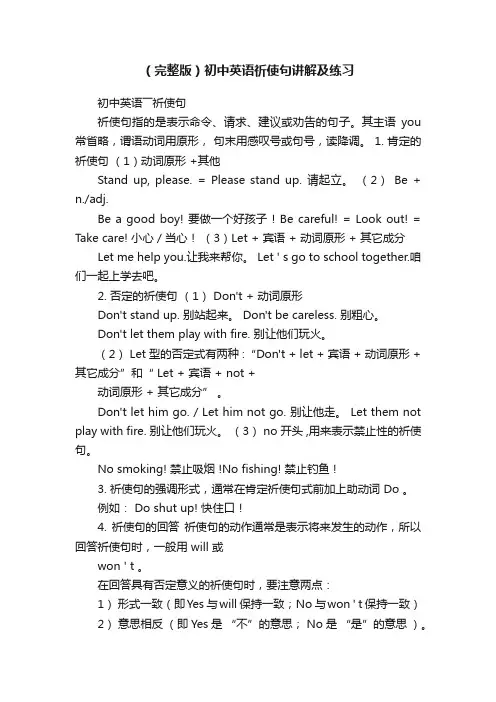
(完整版)初中英语祈使句讲解及练习初中英语――祈使句祈使句指的是表示命令、请求、建议或劝告的句子。
其主语you 常省略,谓语动词用原形,句末用感叹号或句号,读降调。
1. 肯定的祈使句(1)动词原形 +其他Stand up, please. = Please stand up. 请起立。
(2)Be + n./adj.Be a good boy! 要做一个好孩子 ! Be careful! = Look out! = Take care! 小心 / 当心!(3)Let + 宾语 + 动词原形 + 其它成分Let me help you.让我来帮你。
Let ' s go to school together.咱们一起上学去吧。
2. 否定的祈使句(1) Don't + 动词原形Don't stand up. 别站起来。
Don't be careless. 别粗心。
Don't let them play with fire. 别让他们玩火。
(2) Let 型的否定式有两种:“Don't + let + 宾语 + 动词原形 + 其它成分”和“ Let + 宾语 + not +动词原形 + 其它成分” 。
Don't let him go. / Let him not go. 别让他走。
Let them not play with fire. 别让他们玩火。
(3) no 开头 ,用来表示禁止性的祈使句。
No smoking! 禁止吸烟 !No fishing! 禁止钓鱼 !3. 祈使句的强调形式,通常在肯定祈使句式前加上助动词 Do 。
例如: Do shut up! 快住口!4. 祈使句的回答祈使句的动作通常是表示将来发生的动作,所以回答祈使句时,一般用 will 或won ' t 。
在回答具有否定意义的祈使句时,要注意两点:1)形式一致(即Yes 与will 保持一致;No 与won ' t 保持一致)2)意思相反(即 Yes 是“不”的意思; No 是“是”的意思)。
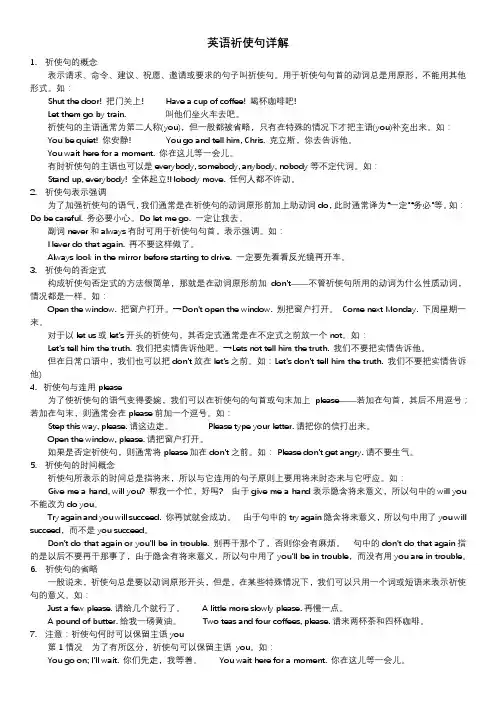
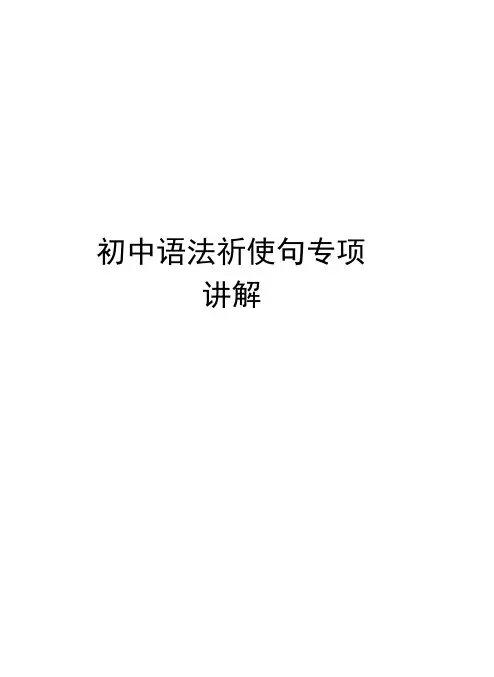
初中语法祈使句专项讲解英语祈使句详解1.祈使句的概念表示请求、命令、建议、祝愿、邀请或要求的句子叫祈使句。
用于祈使句句首的动词总是用原形,不能用其他形式。
如:Shut the door! 把门关上!Have a cup of coffee! 喝杯咖啡吧!Let them go by train. 叫他们坐火车去吧。
祈使句的主语通常为第二人称(you),但一般都被省略,只有在特殊的情况下才把主语(you) 补充出来。
如:You be quiet! 你安静! You go and tell him, Chris. 克立斯,你去告诉他。
You wait here for a moment. 你在这儿等一会儿。
有时祈使句的主语也可以是everybody, somebody, anybody, nobody 等不定代词。
如:Stand up, everybody! 全体起立!Nobody move. 任何人都不许动。
2.祈使句表示强调为了加强祈使句的语气,我们通常是在祈使句的动词原形前加上助动词do,此时通常译为“一定”务“必”等。
如:Do be careful. 务必要小心。
Do let me go. 一定让我去。
副词never 和always 有时可用于祈使句句首,表示强调。
如:Never do that again. 再不要这样做了。
Always look in the mirror before starting to drive. 一定要先看看反光镜再开车。
3.祈使句的否定式构成祈使句否定式的方法很简单,那就是在动词原形前加don't——不管祈使句所用的动词为什么性质动词,情况都是一样。
如:Open the window. 把窗户打开。
→Don' t open the window. 别把窗户打开。
Come next Monday. 下周星期一来。
对于以let us 或let' s开头的祈使句,其否定式通常是在不定式之前放一个not。
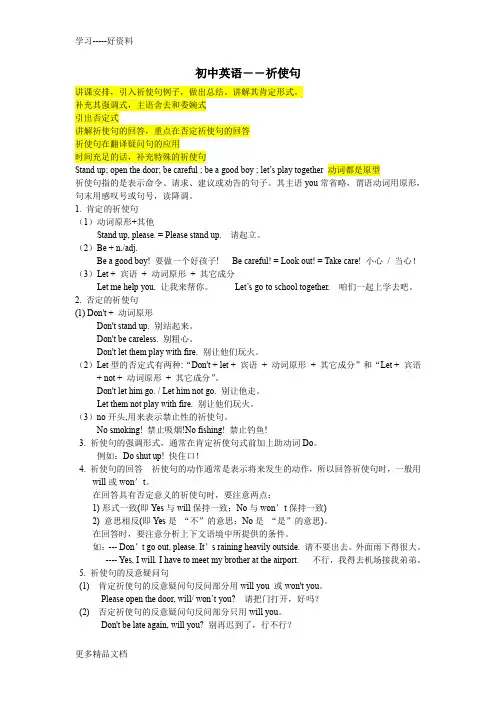
初中英语――祈使句讲课安排,引入祈使句例子,做出总结。
讲解其肯定形式。
补充其强调式,主语舍去和委婉式引出否定式讲解祈使句的回答,重点在否定祈使句的回答祈使句在翻译疑问句的应用时间充足的话,补充特殊的祈使句Stand up; open the door; be careful ; be a good boy ; let’s play together 动词都是原型祈使句指的是表示命令、请求、建议或劝告的句子。
其主语you常省略,谓语动词用原形,句末用感叹号或句号,读降调。
1. 肯定的祈使句(1)动词原形+其他Stand up, please. = Please stand up. 请起立。
(2)Be + n./adj.Be a good boy! 要做一个好孩子! Be careful! = Look out! = Take care! 小心/ 当心!(3)Let + 宾语+ 动词原形+ 其它成分Let me help you. 让我来帮你。
Let’s go to school together. 咱们一起上学去吧。
2. 否定的祈使句(1) Don't + 动词原形Don't stand up. 别站起来。
Don't be careless. 别粗心。
Don't let them play with fire. 别让他们玩火。
(2)Let型的否定式有两种:“Don't + let + 宾语+ 动词原形+ 其它成分”和“Let + 宾语+ not + 动词原形+ 其它成分”。
Don't let him go. / Let him not go. 别让他走。
Let them not play with fire. 别让他们玩火。
(3)no开头,用来表示禁止性的祈使句。
No smoking! 禁止吸烟!No fishing! 禁止钓鱼!3. 祈使句的强调形式,通常在肯定祈使句式前加上助动词Do。
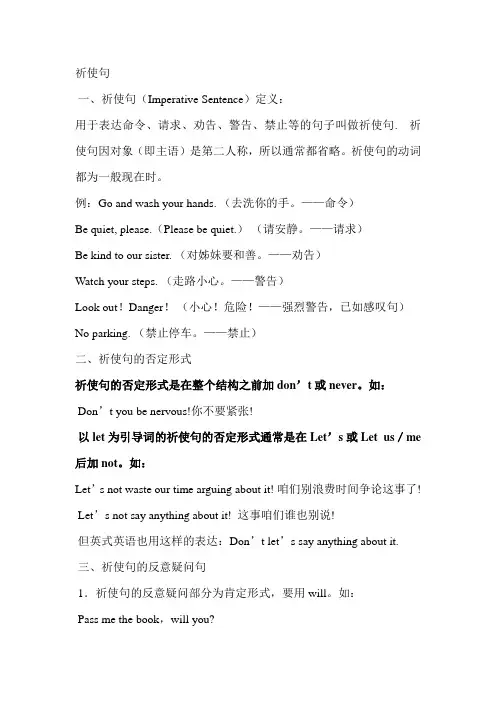
祈使句一、祈使句(Imperative Sentence)定义:用于表达命令、请求、劝告、警告、禁止等的句子叫做祈使句. 祈使句因对象(即主语)是第二人称,所以通常都省略。
祈使句的动词都为一般现在时。
例:Go and wash your hands. (去洗你的手。
——命令)Be quiet, please.(Please be quiet.)(请安静。
——请求)Be kind to our sister. (对姊妹要和善。
——劝告)Watch your steps. (走路小心。
——警告)Look out!Danger!(小心!危险!——强烈警告,已如感叹句)No parking. (禁止停车。
——禁止)二、祈使句的否定形式祈使句的否定形式是在整个结构之前加don’t或never。
如:Don’t you be nervous!你不要紧张!以let为引导词的祈使句的否定形式通常是在Let’s或Let us/me 后加not。
如:Let’s not waste our time arguing about it! 咱们别浪费时间争论这事了! Let’s not say anything about it! 这事咱们谁也别说!但英式英语也用这样的表达:Don’t let’s say anything about it. 三、祈使句的反意疑问句1.祈使句的反意疑问部分为肯定形式,要用will。
如:Pass me the book,will you?2.Let’s表示第一人称的祈使句,反意疑问句为“Shall we?”。
如: Let’s go for a walk,shall we?Let’s forget it,shall we?3.Let me和Let us 表示第二人称的祈使句,反意疑问句为“will you?”。
如:Let us go for a walk,will you?4.其它行为动词引起的祈使句,无论其陈述部分是否定还是肯定的祈使句,多用“will you?”,表一种客气的语气。

(五)祈使句一. 祈使句的句式特征祈使句常常是表达说话人对对方的劝告、叮嘱、请求或命令等。
因此,祈使句中一般没有主语,但根据其句意,实际上是省略了主语you。
祈使句句末用感叹号或句号,朗读时,常用降调。
在表达请求或劝告时,在祈使句前或句末可加上please,以使句子的语气更加缓和或客气。
祈使句一般没有时态的变化,也不能及情态动词连用。
例如:Keep off the grass!勿踩草地!Put the boxes in the small room.把那些盒子放到那个小房间里。
二. 祈使句的肯定句式祈使句的肯定句式一般分为以下三种类型:1. 行为动词原形+其他成分。
例如:Make sentences after the model.根据例句造句。
2. Be动词+其他成分(形容词、名词或介词短语等)。
例如:Be careful when crossing the street.过马路时要小心。
3. Let+宾语+动词原形+其他成分。
例如:Let him go back now.让他现在回去吧。
三. 祈使句的否定句式祈使句的否定句式,通常情况下在句首加上Don’t或Never,一般分为以下四种类型:1. 在祈使句的肯定句式前加Don’t,构成“Don’t+行为动词原形+其他成分”。
例如:Don’t say that again!别再那样说了!2. 在Be动词引起的肯定祈使句前加Don’t,构成“Don’t be +其他成分(形容词、名词或介词短语等)”。
例如:Don’t be careless.不要粗心。
注意:在这种句型中be不能省略;否定副词not不可置于be之后。
3. Let引起的祈使句的否定形式有两种:(1)Let开头的祈使句,如果后面跟第一、第三人称名词或代词的宾格,可在Let前加Don’t,也可在Let后宾格的名词或代词后面加not。
(2)如果以Let’s开头的祈使句,必须在Let’s后加not。
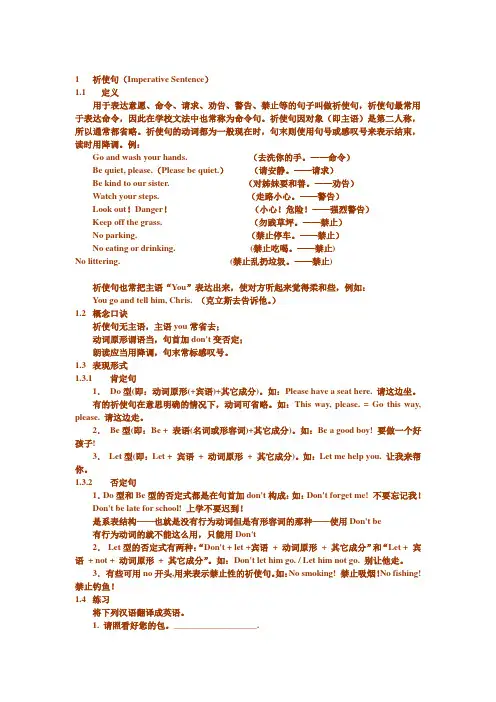
1 祈使句(Imperative Sentence)1.1 定义用于表达意愿、命令、请求、劝告、警告、禁止等的句子叫做祈使句,祈使句最常用于表达命令,因此在学校文法中也常称为命令句。
祈使句因对象(即主语)是第二人称,所以通常都省略。
祈使句的动词都为一般现在时,句末则使用句号或感叹号来表示结束,读时用降调。
例:Go and wash your hands. (去洗你的手。
——命令)Be quiet, please.(Please be quiet.)(请安静。
——请求)Be kind to our sister. (对姊妹要和善。
——劝告)Watch your steps. (走路小心。
——警告)Look out!Danger!(小心!危险!——强烈警告)Keep off the grass. (勿践草坪。
——禁止)No parking. (禁止停车。
——禁止)No eating or drinking. (禁止吃喝。
——禁止)No littering. (禁止乱扔垃圾。
——禁止)祈使句也常把主语“Y ou”表达出来,使对方听起来觉得柔和些,例如:You go and tell him, Chris. (克立斯去告诉他。
)1.2 概念口诀祈使句无主语,主语you常省去;动词原形谓语当,句首加don't变否定;朗读应当用降调,句末常标感叹号。
1.3 表现形式1.3.1 肯定句1.Do型(即:动词原形(+宾语)+其它成分)。
如:Please have a seat here. 请这边坐。
有的祈使句在意思明确的情况下,动词可省略。
如:This way, please. = Go this way, please. 请这边走。
2.Be型(即:Be + 表语(名词或形容词)+其它成分)。
如:Be a good boy! 要做一个好孩子!3.Let型(即:Let + 宾语+ 动词原形+ 其它成分)。
如:Let me help you. 让我来帮你。
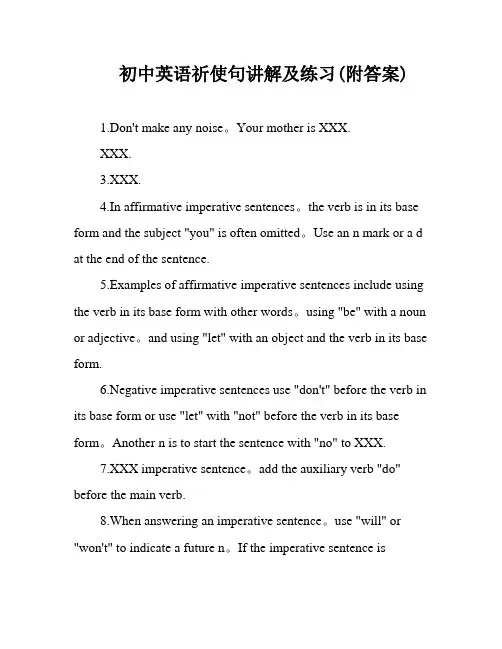
初中英语祈使句讲解及练习(附答案)1.Don't make any noise。
Your mother is XXX.XXX.3.XXX.4.In affirmative imperative sentences。
the verb is in its base form and the subject "you" is often omitted。
Use an n mark or a d at the end of the sentence.5.Examples of affirmative imperative sentences include using the verb in its base form with other words。
using "be" with a noun or adjective。
and using "let" with an object and the verb in its base form.6.Negative imperative sentences use "don't" before the verb in its base form or use "let" with "not" before the verb in its base form。
Another n is to start the sentence with "no" to XXX.7.XXX imperative sentence。
add the auxiliary verb "do" before the main verb.8.When answering an imperative sentence。
中考英语-祈使句例题详解-全1.祈使句定义:祈使句表示请求、命令、叮嘱、号召等,谓语动词用原形,主语通常是不表示出来。
2.析使句的肯定结构例如:Open the door please!Let me do it!Let's go to the cinema together!3.祈使句的否定结构否定形式:多以don't引起;也可用never引起。
例如:Don't be late for school!Don't waste any time please!Never give up!No加名词/动名词NO PHOTOS!禁止照相!NO PARKING!禁止停车!4.注意事项:(1)以let's引起的句子也是一种祈使句,表示建议。
(2)let’s引起的否定句是在let’s后加not构成。
(3)反义疑问句:除了Let’s ……,shall we? 之外,基本都用will you? (4)回答祈使句时要用将来时。
如:—Please remember to take the dog out for a walk every day. 请记住每天带着狗散步。
—Yes, I will. 好的,我会的。
—Do not take your mobile phone to school. 不要把手机带到学校来!—Sorry, I will not. 对不起,我不会了。
(5)掌握“祈使句加and/or加结果状语”结构。
如:Work harder, and you will get good grades. 努力吧,你就会取得好成绩。
Hurry up, or you will be late for class. 快点啊,要不然上课就迟到了。
(6)特殊情况:a)有时为了指明是向谁提出的请求或命令,主语也可以表达出来,也可以加称呼语。
b)有时主语表示出来只是为了加强语气,或是表达“不高兴”“厌烦”“鄙视”等情绪。
祈使句知识点详解(初中英语专项复习)一、定义用于表达命令、请求、劝告、警告、禁止等的句子叫祈使句。
祈使句因对象(即主语)是第二人称,所以通常都省略。
祈使句的动词都为原形,句末则使用句号或感叹号来表示结束,读时用降调。
如:Go and wash your hands. 去洗你的手。
(表命令)Be quiet, please. 请安静。
(表请求)Be kind to our sisters. 对姐妹们要和善。
(表劝告)Look out!Danger!小心!危险!(表警告)No parking. 禁止停车。
(表禁止)二、祈使句结构●肯定结构1> 动原+其他(简称为Do 型)如:Write down your name,please. 请写下你的名字。
Open the window. 开一下窗户。
2>Be + 其他(简称为Be 型)如:Be a good boy!要做一个好孩子!Be quick!快一点!3>Let+宾语+动原+其他(简称为Let 型)如:Let me help you. 让我来帮你。
Let us go to the garden. 让我们去花园吧。
●否定结构1>Do 型,以Don't+动原+其他构成如:Open the window.变否:Don't open the window.2>Be 型,以Don't+be+其他构成如:Be quick!变否:Don't be quick!3>Let 型,否定结构有两种◆Don't+let+宾语+动原+其他如:Don't let her go out. 不要让她出去。
◆Let+宾语+not+动原+其他如:Let her not go out. 不要让她出去。
4>No 型,以No+动词ing/名词构成用于表示禁止的祈使句如:No smoking! 禁止吸烟!No fishing! 禁止钓鱼!No photos! 禁止拍照!三、注意★1>用客气的语气表示祈使句时,可在句首或句尾加上please,但如果在句尾加please,那在please 之前一定要加一个逗号“,”。
祈使句、感叹句、倒装句专练第一部分:祈使句一. 祈使句的句式特征:祈使句常常是表达说话人对对方的劝告、叮嘱、请求或命令等。
因此,祈使句中一般没有主语,但根据其句意,实际上是省略了主语you。
祈使句句末用感叹号或句号,朗读时,常用降调。
祈使句一般没有时态的变化,也不能与情态动词连用。
例如:1. Jack, keep off the grass! 勿踩草地!2. Put the boxes in the small room, Mary. 把那些盒子放到那个小房间里。
二. 祈使句的肯定句式:祈使句的肯定句式一般分为以下三种类型:1. 行为动词原形+其他成分。
例如:Make sentences after the model.2. Be动词+其他成分。
例如:Everybody, be careful when crossing the street.3. Let+宾语+动词原形+其他成分。
例如:Let him go back now.三. 祈使句的否定句式:祈使句的否定句式,通常情况下在句首加上Don’t或Never,一般分为以下四种类型:1. 在祈使句的肯定句式前加Don’t…例如:D on’t say that again!2. 在Be动词引起的肯定祈使句前加Don’t…例如:Don’t be careless.注意:在这种句型中be不能省略;否定副词not不可置于be之后。
3. Let引起的祈使句的否定形式有两种:(1)Let开头的祈使句,如果后面跟第一、第三人称名词或代词的宾格,可在Let前加Don’t,也可在Let后宾格的名词或代词后面加not。
(2)如果以Let’s开头的祈使句,必须在Let’s后加not。
例如:a. Don’t let me go with her tomorrow. =Let me not go with her tomorrow.b. Let’s not tell her the truth whenever we meet her.4. 在公共场合的提示语中,否定祈使句常用“No+名词/V-ing形式”结构,表示“禁止做某事”。
英语祈使句详解1. 祈使句的概念表示请求、命令、建议、祝愿、邀请或要求的句子叫祈使句。
用于祈使句句首的动词总是用原形,不能用其他形式。
如:Shut the door! 把门关上!Have a cup of coffee! 喝杯咖啡吧!Let them go by train. 叫他们坐火车去吧。
祈使句的主语通常为第二人称(you),但一般都被省略,只有在特殊的情况下才把主语(you)补充出来。
如:You be quiet! 你安静! You go and tell him, Chris. 克立斯,你去告诉他。
You wait here for a moment. 你在这儿等一会儿。
有时祈使句的主语也可以是everybody, somebody, anybody, nobody等不定代词。
如:Stand up, everybody! 全体起立!Nobody move. 任何人都不许动。
2. 祈使句表示强调为了加强祈使句的语气,我们通常是在祈使句的动词原形前加上助动词do,此时通常译为“一定”“务必”等。
如:Do be careful. 务必要小心。
Do let me go. 一定让我去。
副词never和always有时可用于祈使句句首,表示强调。
如:Never do that again. 再不要这样做了。
Always look in the mirror before starting to drive. 一定要先看看反光镜再开车。
3. 祈使句的否定式构成祈使句否定式的方法很简单,那就是在动词原形前加don’t——不管祈使句所用的动词为什么性质动词,情况都是一样。
如:Open the window. 把窗户打开。
→Don’t open the window. 别把窗户打开。
Come next Monday. 下周星期一来。
对于以let us或let’s开头的祈使句,其否定式通常是在不定式之前放一个not。
祈使句知识点详解(初中英语专项复习)含义用于表达命令、请求、劝告、警告、禁止等的句子叫做祈使句。
祈使句主语均为第二人称,通常都省略,谓语用动词原形,句末则使用句号或感叹号,读降调。
1.基本构成:动词原形+其他部分(1) 实义动词do+其他Stand up!站起来!(表示命令)Sit down!坐下!(表示)Go and wash your hands.去洗你的手。
(表示)Watch your steps.走路小心。
(表示___________)Look out!Danger!小心!危险!(表示强烈警告,已如感叹句)Keep off the grass.勿践草坪。
(表示禁止)(2) be+ 表语(名词或形容词)Be quiet, please.(Please be quiet.)请安静。
(表示请求)Be kind to our sister.对姊妹要和善。
(表示劝告)Be a good boy.做个好孩子。
(表示劝告)Be sure to come on time.务必按时到来。
(表示命令)(3) Let +宾语+其他Let me help you.让我来帮助你。
Let’s have a rest.咱们休息一会儿。
(包括说话者)Let us try again.让我们再试一次。
(不包括说话者)2.祈使句的否定形式(1) Do型和be型的否定句,一般在句首加don’t ,有时也可加never构成。
如:Don’t come out!不要出去!Don’t ever do that again!不要再做那种事了!Never do things by halves.做事不可半途而废。
Don’t be late for school.上学不要迟到。
Don’t be shy!别害羞!(2) Let型的否定式有两种:“Don't + let + 宾语 + 动词原形 + 其它成分”和“Let + 宾语 + not + 动词原形 + 其它成分”。
祈使句详解及练习英语祈使句(Imperative Sentence)一、定义用于表达命令、请求、劝告、警告、禁止等的句子叫做祈使句,祈使句最常用于表达命令,因此在学校代法中也常称为命令句。
祈使句因对象(即主语)是第二人称,所以通常都省略。
祈使句的动词都为一般现在时,句末则使用句号来表示结束。
例:Go and wash your hands.(去洗你的手。
——命令)Be quiet, please.(Please be quiet.)(请安静。
——请求)Be kind to our sister.(对姊妹要和善。
——劝告)Watch your steps.(走路小心。
——警告)Look out!Danger!(小心!危险!——强烈警告,已如感叹句)Keep off the grass.(勿践草坪。
——禁止)No parking.(禁止停车。
——禁止)祈使句也常把主语“You”表达出来,使对方听起来觉得柔和些,例如:You go and tell him, Chris. (克立斯你去告诉他。
)二、表现形式●肯定结构:1. Do型(即:动词原形(+宾语)+其它成分)。
如:Please have a seat here. 请这边坐。
有的祈使句在意思明确的情况下,动词可省略。
如:This way,please. = Go this way, please. 请这边走。
2. Be型(即:Be + 表语(名词或形容词)+其它成分)。
如:Be a good boy! 要做一个好孩子!3. Let型(即:Let + 宾语+ 动词原形+ 其它成分)。
如:Let me help you. 让我来帮你。
●否定结构:1. Do型和Be型的否定式都是在句首加don't构成。
如:Don't forget me! 不要忘记我!Don't be late for school! 上学不要迟到!2. Let型的否定式有两种:“Don't + let + 宾语+ 动词原形+ 其它成分”和“Let + 宾语+ not + 动词原形+ 其它成分”。
初中英语――祈使句祈使句指的是表示命令、请求、建议或劝告的句子。
其主语you常省略,谓语动词用原形,句末用感叹号或句号,读降调。
1. 肯定的祈使句(1)动词原形+其他Stand up, please. = Please stand up. 请起立。
(2)Be + n./adj.Be a good boy! 要做一个好孩子! Be careful! = Look out! = Take care! 小心/ 当心!(3)Let + 宾语+ 动词原形+ 其它成分Let me help you. 让我来帮你。
Let’s go to school together. 咱们一起上学去吧。
2. 否定的祈使句(1) Don't + 动词原形Don't stand up. 别站起来。
Don't be careless. 别粗心。
Don't let them play with fire. 别让他们玩火。
(2)Let型的否定式有两种:“Don't + let + 宾语+ 动词原形+ 其它成分”和“Let + 宾语+ not + 动词原形+ 其它成分”。
Don't let him go. / Let him not go. 别让他走。
Let them not play with fire. 别让他们玩火。
(3)no开头,用来表示禁止性的祈使句。
No smoking! 禁止吸烟!No fishing! 禁止钓鱼!3. 祈使句的强调形式,通常在肯定祈使句式前加上助动词Do。
例如:Do shut up! 快住口!4. 祈使句的回答祈使句的动作通常是表示将来发生的动作,所以回答祈使句时,一般用will或won’t。
在回答具有否定意义的祈使句时,要注意两点:1)形式一致(即Yes与will保持一致;No与won’t保持一致)2) 意思相反(即Yes是“不”的意思;No是“是”的意思)。
在回答时,要注意分析上下文语境中所提供的条件。
如:--- Don’t go out, please. It’s raining heavily outside. 请不要出去。
外面雨下得很大。
---- Yes, I will. I have to meet my brother at the airport. 不行,我得去机场接我弟弟。
5. 祈使句的反意疑问句(1) 肯定祈使句的反意疑问句反问部分用will you 或won't you。
Please open the door, will/ won’t you? 请把门打开,好吗?(2) 否定祈使句的反意疑问句反问部分只用will you。
Don't be late again, will you? 别再迟到了,行不行?(3) 以let's开头的祈使句反意疑问句反问部分用shall we。
Let's turn on the TV, shall we? 我们把电视打开,好吗?<特别注意> 只有以let's开头的祈使句的反意疑问句的反问部分才用shall we,而let us 开头的祈使句的反意疑问句的反问部分应为will you或won't you.如:Let us stay here, will/ won't you? 请(你)让我们留在这好吗?一. 用括号内所给动词的适当形式填空。
1.It’s an important meeting. _________________ (not, be )late.2.________________ (not,make) any nise! Your mother is sleeping.3.________________ (not, speak) with your mouth full of food and _________ (be) polite.4. ________________ ( not, talk) and ____________ (read) aloud.5._______________ (not,leave) your homework for tomorrow, Larry.6.________________ (look) out! A car is coming.7._______________ (give) us ten years and just see what our country will be like.8.________________ (not, let) the baby cry.9.Wear more clothes or you ____________ (catch) a cold.10. Let’s _______________ (not, say) anything about it.二、单项选择1. The TV is too loud. Please________.A. turn it downB. to turn it downC. turn down itD. to turn down it2. _______ late again, Bill!A. Don't to beB. Don't beC. Not beD. Be not3. _______ cross the road until the traffic lights turn green.A. NotB. Won'tC. Doesn'tD. Don't4. Please help me carry it, ______?A. will IB. will youC. shall ID. shall we5. Don't make so much noise, ______?A. will youB. won't youC. shall weD. do you6. Do you know the girl ______under the tree?A. standB. to standC. standingD. stood7. Kate, _______ your homework here tomorrow.A. bringB. bringsC. to bringD. bringing8. ________ me the truth, or I'll be angry.A. TellingB. To tellC. ToldD. Tell9. I've kept the dog _______Maomao for a long time.A. NameB. namedC. namingD. to name10. Don't you know that _______ is good for our health?A. swimB. swimmingC. swamD. swims11 .Her doctor said: “________ work so hard”A StopB Don’tC Can’tD No12. Sindy, ________ to be here at 8 o’clockA is sureB is sure thatC will be sureD be sure13.________ when you cross the road.A Do careB CareC Do be carefulD To be careful14. ________him the secret, will you?A Don’t tellB Not to tellC Not tellingD No telling15. ________ in bed. It’s bad for your eyes.A Not to readB Don’t readC Don’t to readD Not read16. ________ Your child. We’ll look after him.A Not to worry aboutB Don’t worry aboutC Not worry forD Don’t worry with17.They are very tired. Why ________ have a rest?A not theyB do not theyC don’t theyD not to18 --You look rather tired. ________ stopping to have a rest?-- All right.A Why notB How aboutC Why not toD why don’t19 ______ tell a lie.A HardlyB NotC NoD Never20.Please ________ look outside. Look at the blackboard.A notB don’tC aren’tD can’t三、句型转换1. Will you please read it again more slowly? (改为祈使句)_______ ________ again more slowly, please.2. If you don't listen to me, I'll go. (改为同义句)________ ________me, or I’ll go.3. Let's watch the sports games. (改为反意疑问句)Let's watch the sports games, _______ _____?4. The teachers often tell the students not to be careless. (改为祈使句)_______ _______careless, please.5. Please sit next to Nancy. (改为否定句)_______ _______ next to Nancy.6. Don't forget to turn off the lights, please. (改为反意疑问句)Don't forget to turn off the lights, _______ _______?7. If you move, you'll die. (改为同义句)_______ ______, or you'll die.8. Come to my house tomorrow. (改为反意疑问句)Come to my house tomorrow, _______ _______?9. 这是一个坏了的被子。